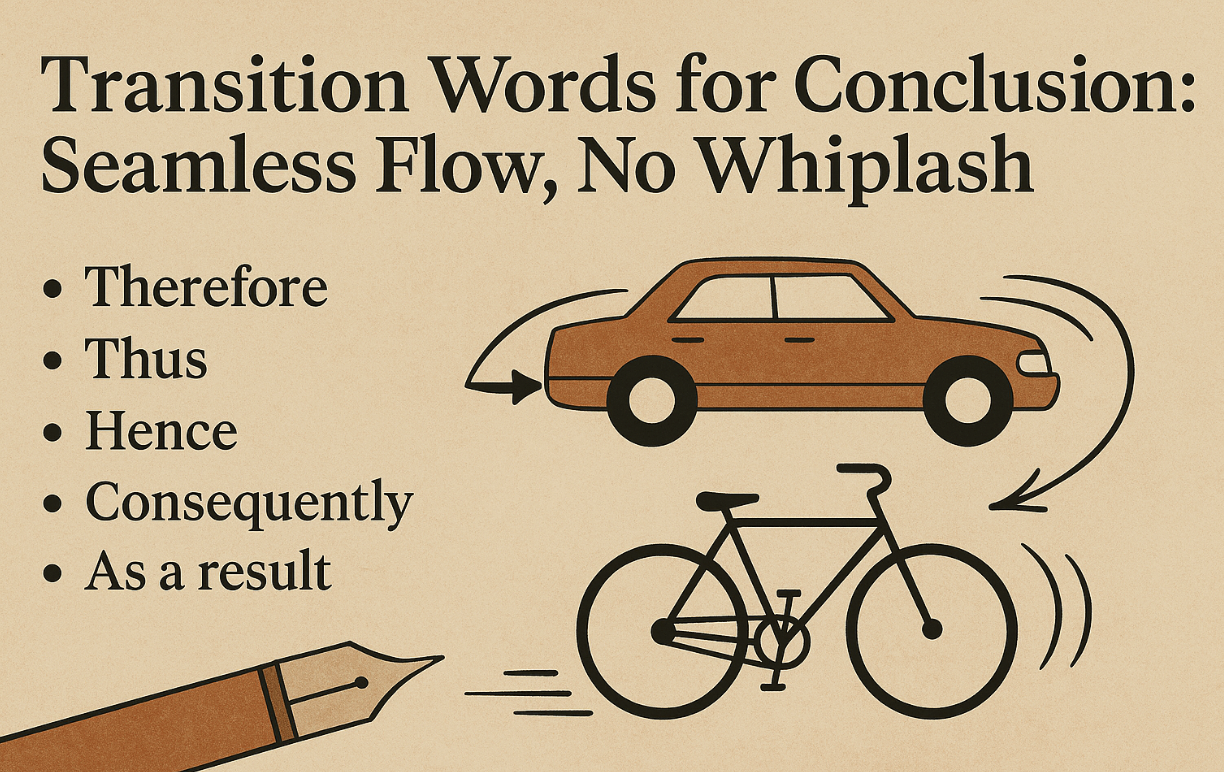We’ve all been there: sitting through a two-hour movie only to be betrayed by a sloppy ending, or nodding politely while someone closes a speech with, “…so yeah, that’s it.” Disappointing conclusions are like flat soda, everything leading up might’ve been fine, but the fizz is gone when it matters most.
Writing isn’t any different. No matter how brilliant your opening line or how sharp your arguments are, if you fumble the ending, readers walk away underwhelmed. That’s where conclusion words and conclusion transition words swoop in to save the day. They’re the verbal cues that whisper, “Relax, we’re wrapping this up,” instead of leaving your audience wondering if they missed the point.
What Are Conclusion Words, Really? (And Why Do They Matter?)
Think of conclusion words as the exit signs of writing. They let your reader know, “This is where the ride ends, thanks for staying on board.” In simple terms, they’re phrases like in conclusion, to sum up, or ultimately that signal you’re tying the bow on your argument, story, or essay. Without them, you risk sounding like someone who just walked out of a room mid-conversation.
Their role is bigger than it seems. Conclusion transition words create flow, give readers that satisfying “ah, we’re done” moment, and prevent your writing from fizzling out. Imagine finishing a persuasive essay and stopping at your last point with no wrap-up. That’s the literary equivalent of awkward silence at the end of a date. Now compare that to a well-placed “all things considered” – that’s your mic drop moment, neat and intentional.
In short, conclusion words aren’t filler; they’re finishers. They tell readers you’ve made your case, you’re confident, and you know how to land the plane without turbulence. Ignore them, and your ending risks feeling abrupt. Use them well, and you leave your audience with clarity, closure, and maybe even a smile.
The Classics: ‘In Conclusion’ and Its Loyal Friends
When it comes to conclusion transition words, the old guard never goes out of style. You’ve seen them everywhere: in conclusion, to summarize, in summary, finally. They’re the dependable workhorses of endings, trotted out in classrooms, essays, and speeches alike. Teachers love them because they’re clear. Readers love them because they’re familiar. And writers lean on them because they get the job done without much fuss.
The pros are obvious: these phrases are safe, universally understood, and practically bulletproof. No reader is going to scratch their head when you close an essay with to summarize. It’s clear as daylight, you’re wrapping things up.
But here’s the catch: they’re also predictable. Lean on them too often, and your writing starts to sound like every five-paragraph essay you ever wrote in middle school. They’re like vanilla ice cream, everyone likes it, but no one’s writing home about it. When you want to keep readers engaged, sprinkling in other words for ‘in conclusion’ can add much-needed flavor.
So yes, the classics are reliable and sometimes necessary. But if you want to surprise, delight, or simply avoid sounding like a textbook, you’ll need more than the usual suspects. Don’t worry, we’ve got plenty of fresher options coming up.
Your Publishing Journey Awaits – Start NowOther Words for In Conclusion: Fresh Alternatives That Actually Work
If you’ve ever felt like in conclusion makes your writing sound like it’s wearing orthopedic shoes, you’re not alone. It’s serviceable, but sometimes you want to add a little flair to your finale. Enter the world of other words for in conclusion, phrases that keep the clarity but ditch the dullness. Think of them as ways to sound smart without sounding like a robot.
Here are a few fresh alternatives, with quick examples to show them in action:
- Ultimately – Great for persuasive or analytical writing.
Ultimately, the evidence shows that renewable energy isn’t optional—it’s essential. - Overall – Works when you’re tying together multiple threads.
Overall, the campaign proved more successful than anyone predicted. - All things considered – A little conversational, but still polished.
All things considered, adopting flexible work hours boosted both morale and productivity. - As we’ve seen – Perfect for wrapping up after a deep dive.
As we’ve seen, character development often drives the most compelling stories.
These phrases do the same job as the classics but give your writing a fresher, more natural finish. They suggest confidence without the cliché, making your wrap-up sound like the conclusion of a TED Talk rather than a fifth-grade book report.
So next time you’re tempted to type in conclusion yet again, remember: you’ve got options. And using other words for in conclusion can give your writing the polish it deserves.
Other Words for Conclusion: Elevating Your Final Lines
Sometimes it’s not the phrase in conclusion that feels tired – it’s the word conclusion itself. If you want your writing to stand out, swapping in other words for conclusion can instantly elevate your final lines. After all, why settle for generic when you’ve got an entire toolbox of alternatives?
Here are some creative stand-ins to match different contexts:
- Wrap-up – Informal and conversational.
And that’s the wrap-up on our marketing strategy for Q3. - Takeaway – Great for business, blogs, or presentations.
The key takeaway? Customer trust is worth more than clicks. - Final thought – Reflective and personal, ideal for speeches or essays.
My final thought is that kindness, not competition, drives true progress. - Closing statement – Formal and structured, perfect for academic or legal writing.
In my closing statement, I reaffirm the importance of equal access to education.
Think of these as different styles of endings: wrap-up is casual coffee chat, while closing statement is courtroom drama. One’s the Beyoncé of wrap-ups – polished, commanding, unforgettable. The other might be the garage band of endings—messy but with charm. The trick is knowing which tone suits your piece.
By experimenting with other words for conclusion, you not only keep your writing fresh but also shape the mood of your finale. Whether you’re going for inspiring, professional, or playful, the right synonym ensures your readers leave with the impression you intended.

Transition Words for Conclusion: Seamless Flow, No Whiplash
There’s a subtle but important difference between plain conclusion words and transition words for conclusion. While conclusion words act like a bold sign that says “The End,” transition words are more like the graceful ushers who guide readers to the door without anyone tripping on the carpet. They don’t just end; they connect.
Think of it this way: without transitions, your writing can feel like a bumpy bike ride – jerky, abrupt, and a little uncomfortable. With them, it’s more like a smooth Uber ride where every turn feels natural.
Here are some go-to transition words for conclusion, with examples that show how they create flow:
- Therefore – The data points to a steady rise in readership; therefore, investing in digital marketing is crucial.
- Thus – The story highlights resilience, thus leaving readers inspired rather than discouraged.
- Hence – The team missed several deadlines; hence, the revised schedule is non-negotiable.
- Consequently – Sales dipped in Q2; consequently, the company shifted its strategy to retention.
- As a result – The character faced his fears; as a result, he finally found peace.
Notice how each phrase doesn’t just slap a “the end” label on the text—it ties cause and effect, one idea to the next. By weaving in these transition words for conclusion, you keep readers gliding toward your final point instead of jolting to an awkward stop.
When (and When Not) to Use Conclusion Words
Here’s a secret: not every paragraph deserves a dramatic curtain call. Conclusion transition words are powerful, but when sprinkled everywhere, they start to feel like confetti at a party that never ends—fun at first, then just messy. Use them where they truly belong: at the finish line of an essay, article, or speech, not after every single point you make.
Style also matters. In academic writing, phrases like therefore or in summary feel right at home. In casual blogs, something lighter like overall or all things considered keeps the tone friendly. And in marketing? You’ll want polished but persuasive wrap-ups – think as a result or ultimately.
The trick is restraint. Too many conclusion words, and your writing sounds like someone saying goodbye five times like your grandma on the phone. Strategic use, on the other hand, ensures your audience feels guided, not nagged.
So remember: conclusion words are tools, not crutches. Use them thoughtfully, and your writing will flow with confidence instead of overkill.
Pro Tips: Making Your Conclusions Memorable
Conclusion words are helpful, but they’re only part of the finale. A memorable ending relies on more than a neat phrase—it’s about structure, tone, and creativity. Think of it as crafting the last bite of a meal: you want it to linger on the palate, not taste like dry toast.
One way to elevate your closing is by ending with a punch. That could be a striking statistic, a call to action, or even a reflective question that sticks in the reader’s mind. In persuasive writing, a line like as a result, small changes create massive impact can double as both a summary and a rallying cry.
Tone matters too. Match your conclusion to the overall vibe—professional, playful, or inspiring. And don’t be afraid to inject a little creativity: a clever metaphor or unexpected twist can make your wrap-up unforgettable.
In short, aim for fireworks finale, not flickering candle. Use conclusion words to guide the reader, but let your style, confidence, and imagination deliver the true mic drop.
Final Thoughts (Yes, This Is the Conclusion)
So there you have it—the grand tour of endings. We’ve strolled past the classics, tested other words for in conclusion, swapped in smarter synonyms for conclusion, and cruised smoothly with transition words for conclusion. The takeaway? You’ve got more options than just in conclusion or its overworked cousins.
Use the classics when clarity is key, the alternatives when you want freshness, and the transitions when flow matters most. Mix them wisely, and your endings will feel polished instead of predictable.
And yes, this really is the conclusion – see what I did there? Go forth and wrap up with style. Your readers will thank you for the fireworks instead of the flickering candle.
FAQs – Conclusion Words
Q: How long is a conclusion?
A conclusion doesn’t need to be a novel – usually 5–7 sentences is plenty. Long enough to restate your main idea and tie everything together, short enough to avoid putting your reader to sleep.
Q: How do I close a paragraph?
Close with a sentence that wraps up the main point and links to what comes next. Think of it as the stepping stone, not the full stop. A phrase like therefore or as a result works well here.
Q: How do you conclude a review?
End by summarizing your overall opinion and giving a clear takeaway. For example: Overall, the film delivers stunning visuals but falls flat in storytelling. Simple, balanced, and decisive.
Q: What is a supporting sentence?
It’s the wingman to your topic sentence. A supporting sentence provides evidence, examples, or an explanation that backs up your main point. Without it, your paragraph is all hat and no cattle.
Q: What word could indicate a conclusion?
Classic options include in conclusion, finally, ultimately, overall, therefore. These are the signals that say: “We’re wrapping this up – stay seated.”
Q: How to start a conclusion in research?
Begin with formal transition words for conclusion such as in summary or to conclude, then restate your thesis and highlight the significance of your findings. Keep it professional, polished, and to the point.








